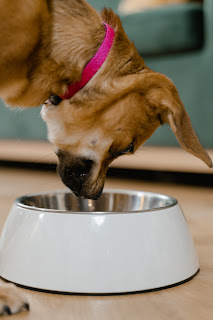When it comes to choosing the right diet for your furry companion, the debate between grain-free and grain-inclusive diets often takes center stage.
Each type of diet has its advocates, and the decision can be overwhelming for pet owners. In this comprehensive guide, we'll explore the nuances of grain-free and grain-inclusive diets, providing you with the information you need to make an informed decision about what's best for your pet's health and well-being.
Understanding Grain-Free Diets
What is a Grain-Free Diet?
A grain-free diet for pets is one that excludes common grains like wheat, corn, rice, and barley. Instead, it relies on alternative carbohydrate sources like sweet potatoes, peas, lentils, and chickpeas.
Benefits of Grain-Free Diets
1) Potential Allergy Management: For pets with grain sensitivities or allergies, a grain-free diet can be a suitable option.
Keywords: Grain-free diet for pets, grain-free pet food benefits
2) Higher Protein Content: Grain-free diets often have a higher protein content, which can be beneficial for active pets or those with specific dietary requirements.
Keywords: High protein grain-free pet food, protein-rich pet diet
3) Weight Management: Due to the lower carbohydrate content, grain-free diets may assist in weight management for pets prone to obesity.
Keywords: Grain-free diet for weight loss in pets, pet weight management
Potential Concerns with Grain-Free Diets
1) Taurine Deficiency: Some studies suggest a potential link between certain grain-free diets and taurine deficiency, which can lead to heart issues, particularly in dogs.
Keywords: Taurine deficiency in pets, heart health in dogs
2) Legume-Related Issues: Grain-free diets often incorporate legumes like peas and lentils. In some cases, high levels of legumes can lead to digestive issues.
Keywords: Legume-related pet food problems, digestive health in pets
3) Complexity of Formulation: Creating a balanced grain-free diet requires careful formulation to ensure all nutritional needs are met.
Keywords: Formulating balanced grain-free pet diets, creating a balanced pet food recipe
Also read: The Impact of Ingredients: Common Fillers and Additives to Avoid
Understanding Grain-Inclusive Diets
What is a Grain-Inclusive Diet?
A grain-inclusive diet includes grains as a source of carbohydrates. Common grains in these diets may include rice, corn, barley, and oats. These ingredients provide energy and fiber.
Benefits of Grain-Inclusive Diets
1) Digestive Health: Grains like brown rice and oatmeal can contribute to healthy digestion due to their fiber content.
Keywords: Fiber-rich pet diet, digestive health in pets
2) Cost-Effective: Grain-inclusive diets tend to be more budget-friendly compared to grain-free options.
Keywords: Affordable pet food options, budget-friendly pet diet
3) Easier to Formulate: Creating a balanced diet with grains can be more straightforward since they are a common and well-understood ingredient.
Keywords: Formulating balanced pet diets with grains, balanced pet food formulation
Potential Concerns with Grain-Inclusive Diets
1) Allergies or Sensitivities: Some pets may have allergies or sensitivities to certain grains, so it's important to monitor their response.
Keywords: Grain allergies in pets, pet food sensitivities
2) Quality Matters: The type and quality of grains used in pet food can vary. opt for whole grains over by-products or fillers.
Keywords: High-quality grains in pet food, choosing grains for pets
Making the Right Choice for Your Pet:
When it comes to deciding between grain-free and grain-inclusive diets, there is no one-size-fits-all answer. Consider your pet's individual needs, any specific dietary requirements, and consult with your veterinarian for personalized advice.
Ultimately, the best diet for your pet is one that provides them with balanced nutrition, supports their specific health requirements, and fits within your budget. Whether you choose grain-free or grain-inclusive, the key is to prioritize high-quality, whole food ingredients.
In conclusion, both grain-free and grain-inclusive diets can be suitable options for your pet, depending on their unique needs. By understanding the benefits and potential concerns of each, you can make an informed decision that contributes to your pet's overall health and well-being.
Keywords: Choosing the right pet diet, pet nutrition considerations





